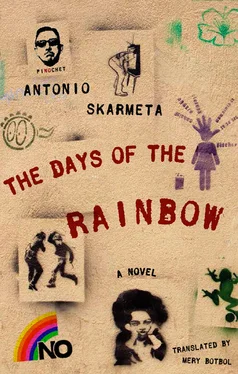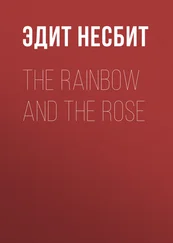The students look weird in suit and tie. Their messy hair does not match the formality. Most of them are scratching their neck with their forefinger; others have loosened the knot of their ties. In the second row, Nico Santos and Che seem to argue about the probable outcomes of a soccer game.
Professor Santos and his special guests — Adrián, Magdalena, and Patricia Bettini — are seated in the third row. On their seats is a label that reads “Faculty member.”
Professor Santos is a faculty member.
Professor Paredes was a faculty member.
In the second row, there is a seat with a card that can be easily read because the seat is empty: “Doña María, widow of Paredes.”
“… which had the astonishing fortune of being the nation’s first spotlight,” Professor Santos sings, without taking his eyes off Nico, who wipes his perspiration with the back of his hand. He’s standing on the same stage where only a few weeks before, still a virgin, he performed in The Cave of Salamanca .
Bettini doesn’t know the anthem. Moreover, his attention is now captured by the man who is approaching, resolute, despite the knees that block his way through the row, and walking toward him and gesturing him to make room. When the man gets close to Bettini, he sits with a satisfied sigh and, without looking at him, extends his hand to him.
It’s Minister Fernández.
“How are you, Bettini?” he asks, adjusting the legs of his pants.
“Minister, what are you doing here?”
The man points at a dark-skinned boy with sharp cheekbones who waves at him from the stage.
Fernández answers by lovingly raising the fingers of his right hand, not higher than his neck.
“It’s my grandson’s graduation. My baby. Luis Federico Fernández. And you? What are you doing here?”
Bettini doesn’t know how to respond. He comes up with something vague, “My son-in-law, I mean …”
“I know, your daughter’s boyfriend. That’s it, exactly that, your daughter’s boyfriend. Meaning, Nicolás Santos …”
“No. Nico Santos. How do you know his last name?”
“Don’t you remember, Bettini? The philosophy teacher, Rodrigo Santos … Did everything come out well?”
“Fine, Minister.”
“ Former minister, don’t forget! And how’s life treating you?”
“Well … I’m alive. Thanks to you, I suppose.”
“Good heavens. You like to exaggerate!”
“I told your men to get the fuck out of there.”
“Wow! How daring of you!”
“Not so much, Dr. Fernández. The construction workers in front of my place were looking at us.”
“Even so.”
Both applauded when the anthem ended and intensified the ovation when the principal came to the front to start his welcome speech.
“And you, what have you been up to lately, Minister?”
“Democracy is coming, my friend. I’m thinking about a position where I could practice my vocation to public service.”
“As a senator?”
“I’d love to. I’m very good at creating projects, laws, all that stuff. Which one of the boys up there is your ‘son-in law’?”
“The hairy one on the left, with a green and blue tie.”
“I see. What’s he going to study?”
“He wants to be either an actor or a writer. And your grandson?”
“Engineer. Like his father. Do you know that my son Basti voted for the No in the plebiscite?”
“Your own son?”
Dr. Fernández tapped his knees, cheerfully, with his fists.
“My own son. Democracy is wonderful, don’t you think so?”
“Despite being ‘a statistical exaggeration’?”
“Despite that. It’s such a tender thing. Imagine — here we are, you and I, happy with life, looking together at the future of our nation. Me, next to my pampered grandson, and you accompanying the young Santos. By the way, I can’t believe you beat us with such a stupid waltz.”
“A stupid waltz, Minister?”
“A waltz super super stupid, Bettini! We can’t deny it!”
“Dr. Fernández, are you familiar with Actuel , the French magazine?”
“What makes you think that? Je ne parle pas français! ”
“They’ve just published an issue with all the songs that changed the course of history in the last fifty years.”
“You’re kidding! And they included the stupid ‘Waltz of the No’ !”
“Exactly, Minister. It’s the 1988 song.”
“And who were the other years’ winners?”
“Jim Morrison, the Beatles, the Rolling Stones.”
“And what are you creating right now?”
“No more songs, Minister. The next step is to win the elections with Olwyn and then send Pinochet to jail.”
Fernández laughed so loudly that the audience looked at him. Even the principal gave him a look full of reproach.
“Hmm. I screwed up, it seems. To put Pinochet in jail?” he said in a low voice. “You won’t be able, Bettini.”
“We will, Dr. Fernández.”
“No, no, no. It feels so good to say no …”
“Yes, yes, yes. We’ll be able to do it.”
“No, no, no. My general won’t be touched, not even with a lady’s petal.”
Now it was Nico Santos’s turn to receive his diploma. Patricia Bettini stood up and applauded, and the audience had the opportunity to admire her Armani dress. Adrián Bettini stood up, shouting, “Bravo,” and Professor Santos scratched his head while holding an unlit cigarette between his lips.
Former Minister Fernández rose, too, and applauded Nico along with Bettini.
“We’ll be back in power, Bettini,” he whispered in his ear. “Step by step, little by little, one step at a time, one little vote at a time.”
“That’s the good thing about democracy, Minister. We had to earn it with blood, sweat, and tears, and you and people like you will able to enjoy it without the slightest effort. And one day, the statistical exaggeration will favor you instead. Those are the rules of the game. Good for you, Minister. All that matters is that you don’t go around killing people.”
“Don’t dwell in the past, my friend. The crisis has been largely overcome. Do you remember when the people asked the armed forces to intervene and impose order? When they cried for a Pinochet?”
“Did you study at the institute, Dr. Fernández?”
“And proud of it! I belong to the Alumni Center Committee.”
“Who was your Spanish teacher?”
“Don Clemente Canales Toro.”
“So you surely studied the Archpriest of Hita with him.”
“I remember it vaguely.”
“A medieval author. Do you remember? Don Clemente Canales authored the modern Spanish version of the Book of Good Love .”
“Sure! Very entertaining! There was a part called ‘Praise of the Small Women,’ right?”
“Bravo! And, by chance, do you remember the fable of the frogs? They were unhappy and demanded that the god Jupiter send them a new king.”
“I don’t remember.”
“So Jupiter sends them a stork that eats two frogs at a time in a single gulp.”
“Hmm. Where are you going with this story?”
“You’ll see. The frogs that survive go to Jupiter and complain: ‘The king you gave us because we foolishly asked you to gives us bad nights and very bad mornings.’ Do you want me to explain the fable to you?”
Dr. Fernández brushed off some lint stuck on his lapel with his right hand.
“It’s not necessary, Bettini. Like you said, democracy is a statistical exaggeration.”
“ You are the one who says that.”
“That’s true. Life is like a game. Now it’s your turn to be ‘it.’ The challenge, if you win the elections, is to do something to overcome this naughty situation in which people are stigmatized, depending on whether they voted Yes or No . You must be modern and accept differences.”
Читать дальше











